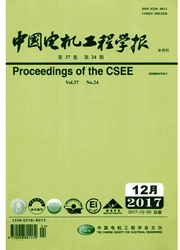

 中文摘要:
中文摘要:
电容电流反馈有源阻尼是抑制并网逆变器中LCL滤波器谐振的有效方式。然而,由于实际电网存在变化的电网阻抗,LCL滤波器的谐振频率会在宽范围内变化,使得电容电流反馈系数的选取变得困难。特别地,当谐振频率等于1/6的采样频率(fs/6)时,无论选取多大的电容电流反馈系数,系统都无法稳定。研究适应电网阻抗宽范围变化的电容电流反馈系数的设计方法,针对不同的谐振频率,推导出系统稳定时的幅值裕度要求,通过分析电网阻抗对幅值裕度的影响,得到最优的电容电流反馈系数。采用这个反馈系数时,除了谐振频率等于fs/6之外,系统都能保持稳定。进一步地,为了提高谐振频率等于fs/6时系统的稳定性,提出环路增益的相位滞后补偿方法。最后,在一台6 k W的原理样机进行实验验证,实验结果证明了理论分析的正确性。
 英文摘要:
英文摘要:
Capacitor-current-feedback active damping is an effective method to suppress the LCL-filter resonance in the grid-connected inverters. However, due to the variation of grid impedance, the LCL-filter resonance frequency will vary in a wide range, which challenges the design of capacitor current feedback coefficient. Moreover, if the resonance frequency is equal to one-sixth of the sampling frequency fs/6), the system can hardly be stable no matter how much the capacitor current feedback coefficient is. In this paper, the optimal design of capacitor current feedback coefficient is presented to deal with the wide range variation of grid impedance. First, the gain margin requirements for system stability are derived under various resonance frequencies. By evaluating the effect of grid impedance on the gain margins, an optimal capacitor current feedback coefficient is obtained. With this feedback coefficient, stable operations will be retained for all resonance frequencies except fs/6. Second, in order to improve system stability for the resonance frequency of fs/6, a phase-lag compensation for the loop gain is proposed. Finally, a 6-kW prototype is tested to verify the effectiveness of the design procedure.
 同期刊论文项目
同期刊论文项目
 同项目期刊论文
同项目期刊论文
 Full Feedforward of Grid Voltage for Grid-Connected Inverter With LCL Filter to Suppress Current Dis
Full Feedforward of Grid Voltage for Grid-Connected Inverter With LCL Filter to Suppress Current Dis Grid synchronization systems of three-phase grid-connected power converters: A complex-vector-filter
Grid synchronization systems of three-phase grid-connected power converters: A complex-vector-filter Small-signal modelling and analysis of wind turbine with direct drive permanent magnet synchronous g
Small-signal modelling and analysis of wind turbine with direct drive permanent magnet synchronous g Pulse width modulation AC/DC converters with line current harmonics minimisation and high power fact
Pulse width modulation AC/DC converters with line current harmonics minimisation and high power fact Zero-Voltage-Switching PWM Full-Bridge Converter Employing Auxiliary Transformer to Reset the Clampi
Zero-Voltage-Switching PWM Full-Bridge Converter Employing Auxiliary Transformer to Reset the Clampi Symmetrical short circuit current characteristics of doubly fed induction generator wind turbine wit
Symmetrical short circuit current characteristics of doubly fed induction generator wind turbine wit Full Feedforward of Grid Voltage for Discrete State Feedback Controlled Grid-Connected Inverter With
Full Feedforward of Grid Voltage for Discrete State Feedback Controlled Grid-Connected Inverter With Multiple-Complex Coefficient-Filter-Based Phase-Locked Loop and Synchronization Technique for Three-
Multiple-Complex Coefficient-Filter-Based Phase-Locked Loop and Synchronization Technique for Three- Improved current regulation of three-phase grid-connected voltage-source inverters for distributed g
Improved current regulation of three-phase grid-connected voltage-source inverters for distributed g Flexible Control of Three-Phase Distributed Generation Systems for Voltage Rise Mitigation in Microg
Flexible Control of Three-Phase Distributed Generation Systems for Voltage Rise Mitigation in Microg 期刊信息
期刊信息
